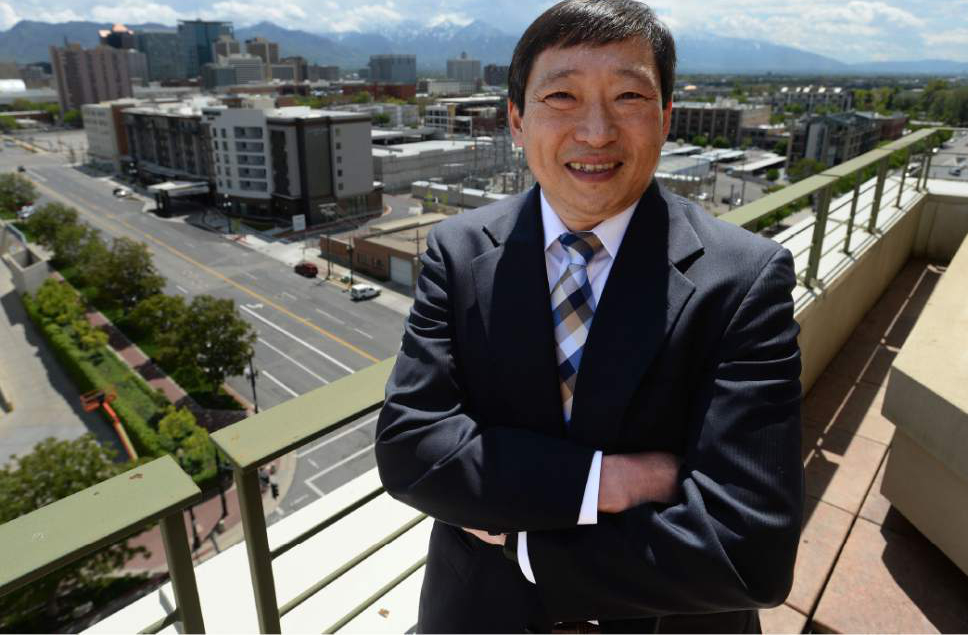This is an archived article that was published on sltrib.com in 2017, and information in the article may be outdated. It is provided only for personal research purposes and may not be reprinted.
Utah election officials were "entirely reasonable" in blocking a BYU professor who attempted to enter the race for outgoing Rep. Jason Chaffetz's seat through a live video chat from China, a judge ruled Friday.
Chia-Chi Teng — who challenged and lost to Chaffetz in last year's GOP primary by a 4-to-1 margin — lobbed a lawsuit against the state this week for rejecting his application to run in the special election.
Teng had filled out the papers and submitted them before the May 26 deadline. And, as a proxy, the professor had sent his son to the state elections office with a computer displaying him in a video call.
Still, his electronic application, sent from outside the country, was rejected. Utah statute requires that candidates file in person.
"It's a reasonable process to make sure that elections are fair and free from fraud," said 3rd District Judge Barry Lawrence in reading his decision.
Teng did not appear in court Friday and could not be reached for comment. He is in China until June 18, according to the lawsuit, while he teaches a group of 20 Brigham Young University students in a global study program.
Though he lost his legal challenge, the professor could appeal directly to the Utah Supreme Court. Teng's attorney, Tim Conde, acknowledged "that's certainly an option." It would have to be an expedited request to accommodate the abbreviated and already-in-process congressional race.
It's unclear whether Teng will file as an unaffiliated candidate — which he can do until June 12 — or run as a write-in candidate.
After Chaffetz announced his June 30 departure date, the state outlined an abbreviated timeline to replace the congressman. Conde argued in much of the hearing Friday that the short notice of that schedule, as well as the brief period to file as a candidate, disadvantaged Teng and violated his constitutional rights. The professor's work trip to China had been planned "for a very long time."
An exception should have been made, Conde suggested, to the in-person mandate for the special election.
"The state is limiting access to the ballot to those who happen to be in Utah during that window," he said.
Additionally, Teng proved that he was serious about running for office by organizing the video conference and having notarized power of attorney, Conde argued. The elections office, Conde said, could see that he was a legitimate candidate from that action and should accept his candidacy declaration (and grant Teng extra time to gather signatures to qualify for the ballot).
Thomas Roberts, who represented the state, said filing in person may have been inconvenient for Teng, but the requirement is warranted. When face to face with a potential candidate, election officials can vet and verify identification and administer oaths, he said.
Teng also knew about the requirement in early May, before filing opened and before he left for China. Why did he not then, Roberts asked, plan a short trip to Salt Lake City to file? Surely, he added, the professor has weekends off; and though China's a bit more distant, people travel from San Juan County to the capital in order to file.
"People might joke that [Teng is] paying more for his lawyers than for the airfare here and back," he said, adding that the weeklong period to file was not overly burdensome.
Though Lawrence ultimately agreed with that argument, the judge wondered whether the statute — which exists only in Utah and New Mexico — might be outdated.
"Is this an anachronism? Is this just a dinosaur?" he asked. Do congressional candidates need to file in person "when we live in the video age that we live in?"
State Rep. Craig Hall, R-West Valley City, has drafted a bill that would lift that requirement, originally put in place by the Legislature. Exceptions exist only for members of the military and state and federal employees outside of Utah during the filing period. Though that's broad enough to include University of Utah employees, BYU is not part of the exemption because it is a private institution owned by The Church of Jesus Christ of Latter-day Saints.
Utah Elections Director Mark Thomas said there's "no doubt" the special election has been rushed. It was done to coincide, he said, with existing municipal elections in the 3rd Congressional District (and to save an estimated $2 million). To change the in-person filing rule now may unleash a torrent of would-be candidates saying they were on vacation or engaged in private employment, too, that kept them from filing.
That could potentially thwart the entire special election schedule, Thomas acknowledged.
At the close of filing, 21 candidates — 15 of them Republicans — had entered the crowded field vying for Chaffetz's seat.
Twitter: @CourtneyLTanner



